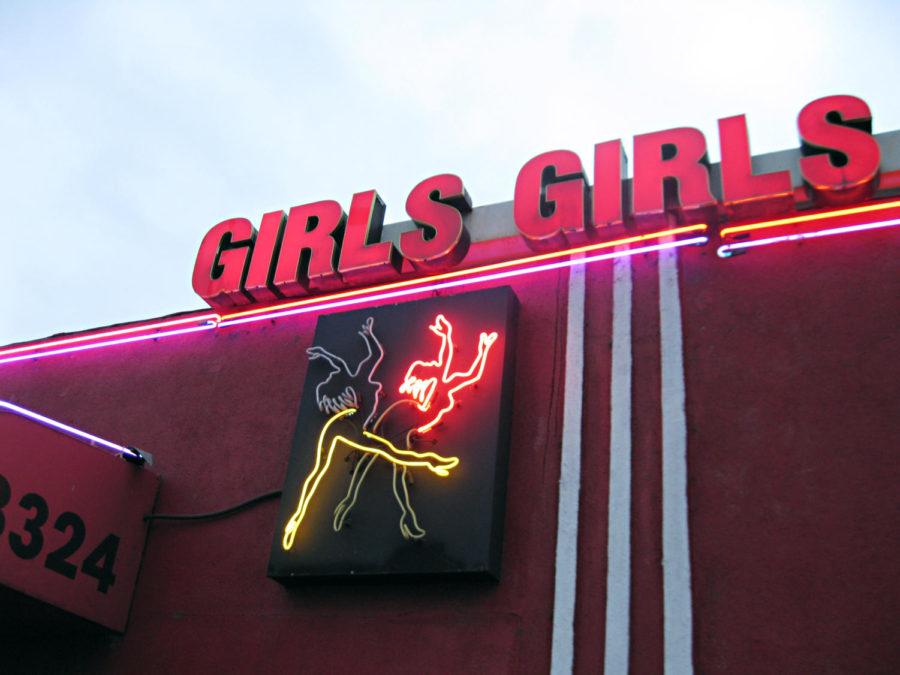Neuendorf: Bring back brothels; protect workers’ health, safety rights
People everywhere — even in rural Iowa — desire sex and are willing to pay a pretty penny to get that sex, and stigma pushed aside, what is the problem with that?
May 2, 2014
Last week, Ames Police Department made four prostitution arrests in an undercover operation to evaluate the rate of human trafficking and prostitution in Ames.
“We were glad it was only four, but obviously that’s four too many and there’s probably a lot going on that we don’t know about,” said Geoff Huff, investigations commander, last week regarding the arrests. “I think it’s an opportunity for us to at least get a look at what we have going on and what we need to work on.”
I found two aspects of this arrest particularly interesting. First off, all four solicitors were men; secondly, this was happening in Ames. Prostitution is stigmatized to no end as a woman’s profession and as happening predominantly in the seedy, downtown alleyways of skyscraper cities.
But, of course, this is not true. People everywhere — even in rural Iowa — desire sex and are willing to pay a pretty penny to get it. Stigma pushed aside, what is the problem with that?
Currently, there are issues with prostitution — issues that more or less have budded because of prostitution’s illicit status in this country. If it were to be legalized, we would at least be able to confront and tackle the indisputable and self-perpetuated disadvantages of illegal prostituting.
The biggest benefit of decriminalization is reducing the fear current prostitutes have toward law enforcement. This fear is what prevents the sex workers from going to the police with occasions of mistreatment and violence from either procurers or customers. Roughly 80 percent of sex workers report being assaulted at some time.
Decriminalization will surely instigate a fear into the abuser because he or she would be aware the sex workers could not be used as a shield against the law.
This would empower the woman. I am generalizing the gender because most — but not all — sex workers are in fact women and fact they are the ones suffering most from in-job violence. It is good for everyone if the women are operating out of a licensed brothel because the brothels adhere closely to the regulations the law has granted them.
The health of sex workers would also be under strict observation if business is done in a brothel. Condoms would be required, as would frequent testing for sexually transmitted diseases.
With criminalization, women are less likely to take care of their well-being either because of the stigma surrounding the act or because they are unaware of the health services available.
Back to the law enforcement side of it: If we decriminalize, we lose the need for police officers to play undercover games. The officers can then actually sharpen their focus and attention on protecting the sex workers rather than arresting and causing detrimental effects for the workers.
And is that not the current excuse for its illegality — to prevent exploitation of the workers when, ironically, arresting has become its own form of exploitation?
With those arrests, who is usually being punished? The sex worker. And who is the victim? If anyone, it is likely to be the sex worker because of the unsafe conditions. But if the conditions are safe — which is the ultimate goal — who would be the victim? No one.
So in keeping prostitution illegal, it looks like a backward excuse to occupy the law enforcers’ time. If the cases of consensual sex are left to the business, then the law can prioritize its time to the child-fueled and unlawful world of human trafficking.
Now for what is commonly used as the selling point for legalizing taboo practices — the potential tax revenue and other monetary gain. Brothels are small businesses and would pay taxes to federal, state or local governments and would create jobs and hopefully positively influence the communities in which they are set.
The center of controversy for legitimizing sex work is the surviving and relentless fear of accepting the act of sex as normal and as a necessity or hobby to some. If it is the goal of those kind of opposers to rid the world of its powerful-enough-to-pay sex drive, then they are out of luck because it is not happening.
Not everyone — heck, not even a small fraction of America — will agree with the ethics of prostitution, but its about time we accept it as a part of some lifestyles.

















